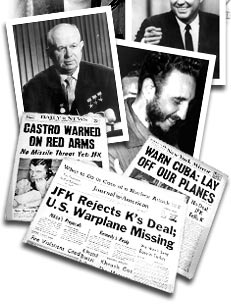
The final days of that October were grim. At the beach, the rough seas spilled over the sand blowing in the wind. The militia dug trenches, so close to the coast, that their walls caved in. Guanabo was desolate, more so than normal for that time of year, and the locals who stayed after the evacuation of the last few hours did not understand the magnitude of the drama that was evolving in our archipelago. The Cuban rRevolution, the one that claimed to the world that it was so pure, independent and mighty like the palm trees, had just been undressed by the spy planes from North America. The photos of soviet specialists secretly installing the nuclear missiles around the island were seen by the entire world.Fifty years have passed since that monumetal blunder that placed humanity in the fringes of a nuclear hell. Now that there is only a handful of the principle actors of that crisis left, we ask ourselves who really gained anything, and who lost. The answer, coincidentally, is in the published text from Fidel Castro on October 21, 2012 at 10:12a.m. “When Kruschev proposed to install mid range projectile missiles similar to those installed in Turkey by the United States — in the need for solidarity, Cuba did not hesitate to take the risk. Our conduct was pure and ethical. We will never ask for forgiveness from anyone for what we did. It is true that half a century has passed, and we are still here holding our heads up high.”
It was not important then that Cuba was not at all consulted in the dialogue between the United States and the USSR which resolved the conflict. Nor that the Cuban authorities, which are the same as today, found out via the shortwave transmission in Radio Moscow the decisions that had been made. It did seem to bother some when the newspaper Revolución, the official paper predecessor of the Granma, published the headers: “The USSR orders the removal of missiles from Cuba”. Today the world around us is different, it has changed: the Soviet Union no longer exists. The cold war ended. The missile crisis is history. But, for Cuba there are still remnants of those days; because, lamentable but true, after half a century of economic, political and social disaster, they are still here.
Translated by: Marina Villa
October 24 2012
